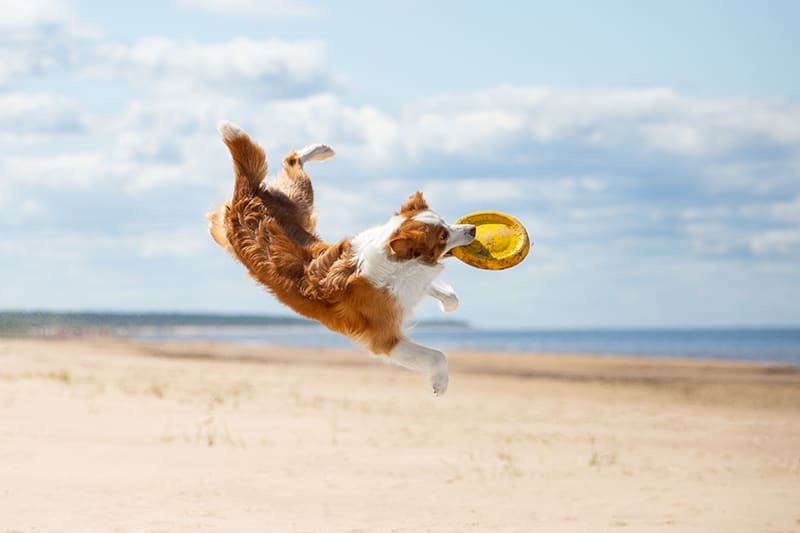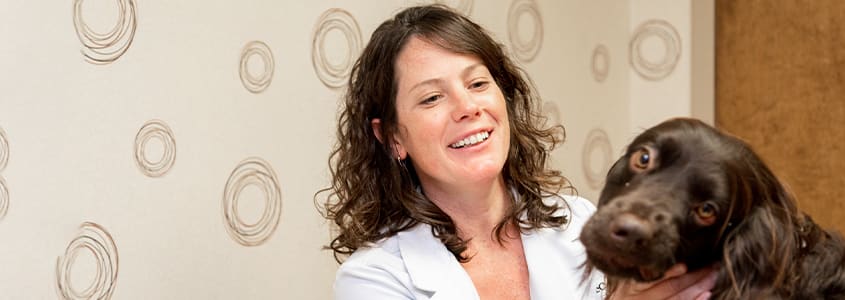What is Tibial Plateau Leveling Osteotomy (TPLO) surgery?
If your dog damages their cranial cruciate ligament, your vet will likely advise surgery to correct it. One common surgery used to repair the cruciate ligament is called TPLO, short for Tibial Plateau Leveling Osteotomy. The surgery can help your dog get back to running and jumping like normal!
Unlike other surgeries, TPLO restores mobility to your dog's knee without relying on the damaged ligament for stability.
How does a torn cruciate ligament cause knee pain?
When a dog is suffering from a torn cruciate ligament, pain arises from the knee's instability and a motion called 'tibial thrust'.
Tibial thrust is a sliding movement caused by the transmission of weight up a dog's shin bone (tibia) and across the knee, causing the shinbone to jump forward in relation to the dog's thigh bone. This forward "thrust" movement occurs because the top of a dog's tibia is sloped, and can not prevent unwanted movement.
What does TPLO surgery entail?
TPLO surgery eliminates the need for the cranial cruciate ligament by reconfiguring your dog's knee.
To perform TPLO surgery, a surgeon makes a curved cut to the patient's tibia before rotating the tibial plateau (top section) to level the tibia and femur. Once the tibial plateau is in the desired position the TPLO surgery is completed by attaching a metal plate to stabilize the knee as it heals around the new configuration.
How long will it take for my dog to recover from TPLO surgery?
Following TPLO surgery, dogs will be able to walk on the leg within 24 hours, and most will be bearing moderate amounts of weight on the leg within 2 weeks.
Recovering from TPLO surgery is a long process for dogs, but the recovery time for TPLO surgery is still much shorter than comparable surgeries, coming in at around 12-16 weeks. Expect your dog to return to full physical activity approximately 6 months after TPLO surgery.
Help, what do I do if my dog jumped after TPLO surgery?!
Following your vet's post-operative instructions will help your dog to avoid re-injuring the leg while it's still healing. Your dog should not be permitted to run or jump after TPLO surgery until the knee has had time to heal. However, incidents might still occur. No one is perfect, and unfortunately, there's no way to explain to our dog friends what TPLO surgery is.
Be sure everyone in the household, including guests, is aware of the rules, and try not to leave couches or beds uncovered if your dog is used to jumping up on them prior to their TPLO surgery.
There are typically no complications involved with recovery from TPLO surgery, so your dog will likely be fine after a single incidence of exerting the knee too early, but it's best to limit jumping or running as much as possible. Be especially vigilant about monitoring your dog's condition if you know they have recently jumped.
You'll want to contact your veterinarian if you notice any of the following symptoms:
- Signs of infection or inflammation at the incision site
- Diarrhea or vomiting
- Reluctance to put weight on recovering leg
- Sensitivity to pain medications
- Loss of appetite
- Constipation
- Missing staples or stitches
Your vet will be able to examine your pup for signs of complications and treat any issues before they become more severe.
Note: The advice provided in this post is intended for informational purposes and does not constitute medical advice regarding pets. For an accurate diagnosis of your pet's condition, please make an appointment with your vet.
To find out whether your dog is a candidate for TPLO surgery, book an appointment with our experienced Greensboro vets today. Our vets have experience helping dogs regain more comfortable mobility.
Looking for a vet in Greensboro?
We're always accepting new patients, so contact our veterinary hospital today to book your pet's first appointment.
Related Articles View All
What happens during a routine pet exam?
Routine wellness exams are a proactive way to help safeguard your pet's long-term health and vitality. Why should you take your healthy pet to the vet? What happens during a pet health wellness exam? Find out.
How much does an emergency vet visit cost?
Emergency veterinary care can be costly, but planning ahead allows you to make decisions about your pet's care based on their needs rather than financial restrictions. Today, we look at the cost of emergency vet care, and how to be ready if your pet needs emergency treatment.
Kidney Failure in Dogs
Chronic and acute kidney failure are serious health problems commonly seen in dogs. Here, you will learn about the differences between chronic and acute kidney failure in dogs, the signs to watch for and how these conditions are treated.
Signs of Bladder Infections in Dogs & How They Are Treated
Many dogs suffer from bladder infections and other issues affecting the urinary tract system. What causes bladder infection in dogs? What signs should you watch for? How do vets treat bladder infections in dogs? Read on to find out.


